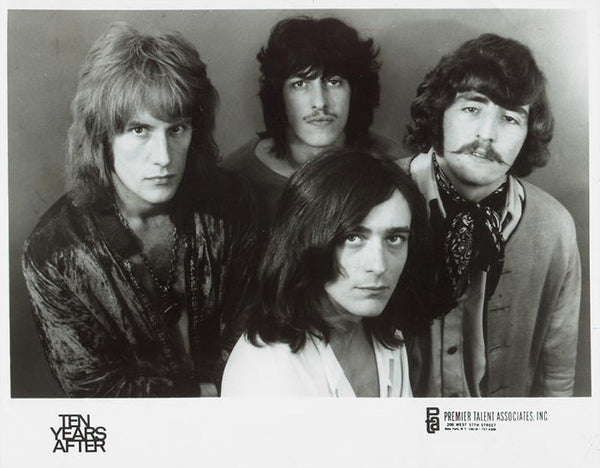From Nottingham in the English Midlands, Blues/ hard rock quartet Ten Years After became one of the most successful British musical exports of the late 1960s. One of the star bands of the 1969 Woodstock Festival, and the subsequent film/ soundtrack, TYA became a touring favourite in the USA, enjoying a diehard fanbase and shifting considerable quantities of albums.
The name "Ten Years After" was reputedly chosen by the band to commemorate the tenth anniversary of Elvis Presley's breakthrough year, 1956. The band, which formed in 1966, wanted to pay tribute to Presley, a major influence on guitarist Alvin Lee.
Based on the lightning-fingered guitar skills of Alvin Lee, alongside Ric Lee (drums), Leo Lyons (bass) and Chick Churchill (keyboards, vocals), the core quartet remained remarkably solid throughout their existence, until the departure of Alvin Lee in 2003.
Lee famously played a 1958 Gibson ES-335 semi-acoustic guitar, known as ‘Big Red’, festooned with stickers, and heavily ‘modded’ and road-worn. He used the guitar at Woodstock in 1969, and on everything from the self-titled Ten Years After debut album, through to his 1994 solo album, I Hear You Rocking.
Whereas Alvin Lee was clearly the focal point for the band, the other three TYA crew were no mere ‘backing band’. The Ric Lee/ Leo Lyons rhythm section were pacy, punchy and effective, but also had that knack for being able to swing as much as ‘rock’, which comes from being schooled in Jazz, and keyboardist Churchill provided a useful foil to Alvin Lee’s fretboard fireworks, adding useful texture on piano and Hammond organ.
The Decca Record label, and its subsidiary, Deram (to which TYA were signed) had a big role in the British Blues Boom of the late nineteen-sixties, signing artists such as John Mayall’s Blues Breakers, The Savoy Brown Blues Band, The Keef Hartley Band, and numerous others. TYA were put under the experienced production auspices of none other than Mike Vernon, who had performed the same role on the epochal John Mayall & The Bluesbreakers With Eric Clapton album of 1966 – the famous ‘Beano’ album in which Eric Clapton’s status as guitar-playing ‘Godhead’ was forever established. TYA, featuring a similarly fiery guitar player, were obviously in safe production hands.
As with many bands across the years, the debut Ten Years After album, whilst displaying some of the inevitable tentativeness in places (they’ld make many more accomplished albums), is nonetheless a firm fan favourite. The second album, ‘Undead’, was recorded at Klook’s Kleek – in reality the Railway Tavern in West End Lane, in the London suburb of West Hampstead, which fortunately was a few hundred yards from the Decca recording studios in Broadhurst Gardens. Indeed, recording cables were actually run along the roofs of the intervening buildings between the studio and the venue in order to be able to use the studio facilities.
The aim of cutting a live album was to impart more of the band’s incredible live fervour on record, which the debut album had hinted at in passages, but ultimately did not quite deliver. Also, the band were recording what would be their third album, ‘Stonedhenge’, but it would not have been finished in time to coincide with their first US tour, in which the legendary West Coast concert promoter Bill Graham, having been impressed with the bands’ debut, had promised the band a prestigious show at the Fillmore West venue in San Francisco. The original concept was that ‘Undead’ would be a release purely for the American market, but Deram relented and agreed to a UK release due to the considerable pressure from the TYA home fanbase.
The band’s output in the early 70s was prolific, and after ‘Stonedhenge’, they recorded five more studio albums with the classic ‘Rock & Roll Music To The World’ released in 1972 and culminating with ‘Positive Vibrations’ in 1974. There followed a 15 year hiatus before the band’s final studio album featuring Alvin Lee, ‘About Time’ which was released in 1989.
Ten Years After continue to tour, especially in Europe, and record sporadically, with only drummer Ric Lee from the original line-up. Bassist Leo Lyons has a band called One Hundred Seventy Split with guitarist Joe Gooch, who took the place of Alvin Lee in TYA. Keyboard player Chick Churchill has now retired from playing and touring, and Alvin Lee died in 2013 from complications following routine surgery.
With thanks to Alan Robinson

